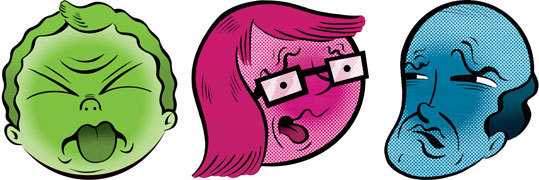Morally Disgusting
Never let your sense of morals get in the way of doing what’s right. — Isaac Asimov
I have a confession to make: For the first time in almost 20 years, I killed a spider.
And the guilt is tearing me apart.
Now, for most of you, your first assumption was probably that I’m crazy—but that assumption probably came a long time ago. The truth is, that since I read a book about how spiders save this planet (without them, the world would be overrun with insects!) I have taken up the call to protect my eight-legged brethren.
However, two nights ago, having flashbacks to the time a spider tried to burrow into my ear (want the shivers? here’s the story), a strong sensation of disgust came over me, and I, regrettably, smushed the spider beneath a tissue.
But this raises two interesting (and related) topics: morality and disgust.
Numerous studies have documented a connection between morality and disgust, but one study in particular looks at it in a most interesting way.
As we say in academia: “It’s sexy research.”
These researchers wanted to know: If you felt disgust toward something, would you consider it immoral? To do this, they ran two studies, each with about 60 participants who were all hypnotized.
That’s right—social psychologists using some hypnosis.
The hypnotist made half of the participants feel “a brief pang of disgust…a sickening feeling in your stomach” when they saw the word take, while the other half were made to feel this way when they saw the word often.
Subsequently, the hypnotist made sure the participants didn’t remember these directions.
Coming out of hypnosis, the participants read a series of vignettes about immoral activities (e.g., a congressman who took bribes, a student who stole library books, etc.) and had the participants rate how immoral the behavior was.
However, half of the vignettes had the word take in them, while the other half had often.
Afterward, the researchers measured the participants’ rating of immorality and found that the vignettes using the participants’ respective, hypnotized word were rated as significantly more immoral.
Researchers contend that the feeling of disgust evolved in humans in order to help our omnivorous species know what to eat. That is, disgust indicates that something like rotten meat shouldn’t be consumed.

However, although disgust began as a food-related emotion, as we evolved into more social animals, it became an appropriate emotional response for socially inappropriate behaviors. In fact, across cultures, the words and physical expressions used to reject physically disgusting things are also the ones used for socially “immoral” behaviors.
For most people, seeing spiders elicit disgust because that’s the body’s instinctual way of saying “avoid! avoid!” But for me, I feel disgust at the death of a spider, because my cross-wired brain perceives such an action as socially reprehensible.
I mean, you’re talking to the guy, who at age 10, after seeing the first Spider-man movie, went around picking up spiders hoping they would bite him and give him super powers.
Spiderly,
Jdt
Wheatley, T., & Haidt, J. (2005). Hypnotic disgust makes moral judgments more severe. Psychological science, 16(10), 780-784.
Schnall, S., Haidt, J., Clore, G. L., & Jordan, A. H. (2008). Disgust as embodied moral judgment. Personality and social psychology bulletin.









Lol Jake!
I’m glad to have added a chuckle to the world 🙂